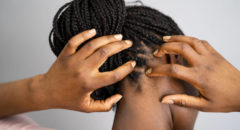
As a little girl, Alisha Bridges developed patches of dry skin on her elbows and knees but her family chalked it up to being “an ashy little girl.” When she was 7, Alisha came down with Chickenpox. Once the Chickenpox virus was over, her grandmother noticed that her skin was changing and “manifesting into something else.” After a visit to the Dermatologist, Alisha was diagnosed with psoriasis.
From that time until she was about 26, Alisha experienced a series of misdiagnoses. The doctors were not familiar with the condition in darker skin tones so they would suggest she had other diseases or a fungus.
They treated her for those conditions and the treatments would never work. She also went through “nine years on and off of phototherapy, which never helped."
Alisha describes this phase as a “revolving door of ineffective treatments and methods to try to minimize my symptoms due to this disease.” This has been a challenging journey for Alisha.
Alisha experienced a mild case of arthritis in high school, primarily in her right knee. Because she lived in a cold climate, she didn’t think much of it.
RELATED: Day 1: Just Been Diagnosed with Psoriasis
She later learned that she had (PsA) Psoriatic Arthritis. She says this disease has impacted every part of her life; From playing sports, skating, dating, and participating in pageants to shopping for a wedding gown.
She recalls feeling self-conscious about accepting invitations to pool parties and even wearing long-sleeve shirts to work when the uniform called for short sleeves. Alisha also shared how being approached by strangers and even children has been a difficult part of her experience.
By the time Alisha found a Black female dermatologist, 90% of her body was covered by psoriasis. This doctor was the first to give her a biopsy, which confirmed that she did have psoriasis and none of the diseases the other doctors had diagnosed her with.
About a year later, Alisha went to another dermatologist that she “knew from the National Psoriasis Foundation” who was able to provide treatment that cleared her 100% for the first time.
Alisha shares that since being with this doctor, she has been on five effective Biologics (injections that help control symptoms when other treatments fail). She attributes this successful treatment to this doctor’s experience working with different skin tones and working on clinical trials.
Alisha wants people suffering from psoriasis to find a support group and learn to advocate for themselves. Ask the doctors questions, including “how involved they’ve been in clinical studies?” Inform the doctors of other symptoms, even if they seem to be unrelated. Share information about all medications, even if you’re no longer taking them. Tell the doctors everything. Let them know how psoriasis is impacting you mentally and emotionally. “Show your body and if they don’t look, leave.”
RELATED: Managing Psoriasis: When, Where & How
Alisha has a message for the public: “Be open to learning about psoriasis. Be willing to get an understanding and stand up for those suffering with it.”
She also has a message for doctors: “Be more diligent in treating all ethnicities.” Alisha urges doctors to involve darker-skinned people in their research. She says they should “step up and speak on behalf of patients when they see inconsistencies in images for clinical trials.”
She also hopes more doctors will tell families about Camp Discovery. A free camp for children with chronic skin conditions that she only learned about 5 years ago. She’s been volunteering ever since.
Alisha has been very involved in helping to improve the lives of psoriasis patients. She has had an audience with members of Congress requesting that they change the rules for STEP Therapy, which would decrease the number of steps required to get treatment.
Currently, Alisha is working on a clinical study called “Light Therapy.” To date, her most important work is with Determi-Nation, a health movement led by healthcare providers, patients, and advocates working together to stop the cycle of suffering for people of color living with psoriatic disease.
For information on Determi-Nation, click here.








